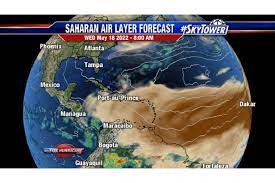Saharan Dust: Impacts on the Virgin Islands

Saharan dust layer at sunset
- Air Quality: When Saharan dust arrives in the Virgin Islands, it can degrade air quality. The dust particles can lead to increased levels of particulate matter in the atmosphere, which can affect people with respiratory conditions, such as asthma or allergies. The dust can cause irritation in the respiratory system and potentially worsen existing health issues.
- Reduced Visibility: The presence of Saharan dust can reduce visibility, creating a hazy or milky appearance in the atmosphere. This reduced visibility can affect both terrestrial and maritime activities, including driving, aviation, and navigation.
- Sunsets and Sunrises: One unique and visually stunning effect of Saharan dust is the amplification of vibrant sunsets and sunrises. The dust particles in the atmosphere scatter sunlight, leading to a colorful display of red, orange, and pink hues during these times of the day.
- Marine Ecosystem: Saharan dust carries minerals and nutrients from the African continent, which can be beneficial to the marine ecosystem of the Virgin Islands. The deposited dust particles provide essential nutrients like iron to the ocean, supporting the growth of phytoplankton and other microscopic marine organisms. These organisms form the base of the marine food chain and contribute to the overall health of the ecosystem.
- Impact on Coral Reefs: While Saharan dust can provide nutrients to the marine ecosystem, excessive dust deposition can have negative effects on coral reefs. The dust can smother and block sunlight from reaching the coral, potentially causing stress or bleaching events. However, the exact impact on coral reefs depends on the concentration and duration of the dust events.
It’s important to note that the intensity and impact of Saharan dust on the Virgin Islands can vary depending on the specific weather patterns, prevailing winds, and the amount of dust being transported at any given time. Local meteorological agencies and environmental organizations often monitor and provide updates on Saharan dust events to raise awareness and inform the public about potential health risks and environmental impacts.

Large system of dust shown on the news
Furthermore, collaborations between international research institutions and local environmental agencies foster a comprehensive understanding of the ecological impact of Saharan dust. By studying the response of coral reefs to dust deposition and identifying strategies to mitigate potential damage, conservation efforts can be strengthened to preserve the biodiversity and resilience of these precious ecosystems.
To mitigate the effects of Saharan dust, individuals can take steps such as staying indoors during peak dust concentrations, keeping windows closed, and using air purifiers to improve indoor air quality. It is also crucial for local authorities and organizations to monitor air quality levels, provide timely alerts and updates, and raise awareness about the potential health risks associated with Saharan dust events.
